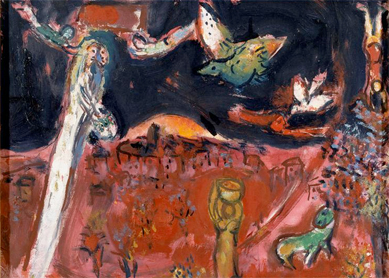The beautiful lyrics about heterosexual sensuality, desire, and love in the Song of Songs beg to be identified with and embraced. Yet as we read and reread, we become aware of small but persistent nuances that raise issues of gender and class and that cloud the general, seemingly idyllic picture that pervades much of the Song (
In theater as well as in fiction, the characters with the most lines are usually the more dominant. In the Song, female voices make up more than 60 percent of the text; their voices are bolder, more playful, more outspoken, serious, and artistic than the voices attributed to males. A woman’s voice opens
This impression of female ascendancy is buttressed by one of the most poignant and comprehensive love “credos” to be voiced by a female:
Let me be a seal upon your heart,
Like the seal upon your hand.
For love is fierce as death,
Passion is mighty as Sheol;
Its darts are darts of fire,
A blazing flame.
Vast floods cannot quench love,
Nor rivers drown it.” (
It seems significant that a female speaker delivers this definition of love, as the author (or editor) could easily have chosen otherwise given that the Song of Songs is embedded in the Hebrew Bible, a patriarchal text: this lyrical declaration could have been attributed to a biblically more-often dominant male voice. It is also significant because of its fierceness and depth of emotion. It shocks us in its pain and exuberance, strength and weakness, in the hyperbolic radicalism that uses corporeal allusions as well as primal metaphors and symbols.
So, you may say, this is in keeping with the rest of this love lyric. Its female speakers are bold and physical and in general are allowed to be so: both near the beginning (“My beloved to me is a bag of myrrh, Lodged between my breasts,”
If a man offered all his wealth for love,
He would be laughed to scorn. (NJPS)
This last sentence is a comment that brings us down to earth: when a man (male) gives all his fortune for love, he is despised. Note: he gives away his fortune, and not his life or his body, as the woman would do by her declaration.
The Song contains additional traces of kinship, class, and social norms. Brothers attempt to regulate the sexual behavior of their sisters (
Female lovers—if we agree that more than a single heterosexual couple resides in the poems—are mostly depicted as country maidens, although the chorus of the “daughters of Jerusalem” is urban. The urban was usually considered more cultured and educated than the rural; for instance, being “dark” from exposure to sunshine, even though “comely” (
This paradox brings us back to “reality”: females have only their own selves to give and would give their bodies and souls for love, not the money or property they apparently lack control of. Men are not expected to sacrifice their wealth for love, certainly not their souls or bodies. Not even in the world of the Song of Songs.
Bibliography
- Brenner, Athalya and Carole R. Fontaine, eds. A Feminist Companion to the Song of Songs. Second Series of The Feminist Companion to the Bible. Edited by Athalya Brenner. Sheffield, UK: Sheffield Academic Press (now Bloomsbury), 2000.
- Brenner, Athalya, ed. A Feminist Companion to the Song of Songs. First Series of The Feminist Companion to the Bible. Edited by Athalya Brenner. Sheffield, UK: Sheffield Academic Press (now Bloomsbury), 1993.
- Trible, Phyllis. “Love’s Lyrics Redeemed.” Pages 144-65 in God and the Rhetoric of Sexuality. Minneapolis: Fortress Press, 1978.
- Exum, J. Cheryl. Song of Songs. A Commentary. Ed. James L. Mays, Carol A. Newsom, and David L. Petersen. Old Testament Library. Louisville: Westmisnter John Knox Press, 2005.




